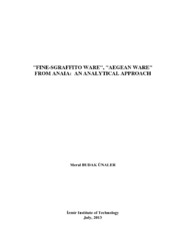Please use this identifier to cite or link to this item:
https://hdl.handle.net/11147/2952Full metadata record
| DC Field | Value | Language |
|---|---|---|
| dc.contributor.advisor | Akkurt, Sedat | - |
| dc.contributor.author | Budak Ünaler, Meral | - |
| dc.date.accessioned | 2014-07-22T13:48:39Z | - |
| dc.date.available | 2014-07-22T13:48:39Z | - |
| dc.date.issued | 2013 | - |
| dc.identifier.uri | http://hdl.handle.net/11147/2952 | - |
| dc.description | Thesis (Doctoral)--Izmir Institute of Technology, Mechanical Engineering, Izmir, 2013 | en_US |
| dc.description | Includes bibliographical references (leaves: 155-164) | en_US |
| dc.description | Text in English; Abstract: Turkish and English | en_US |
| dc.description | xi, 164 leaves | en_US |
| dc.description | Full text release delayed at author's request until 2016-08-06 | en_US |
| dc.description.abstract | Excavation in Byzantine castle, known as Kuşadası Kadıkalesi, Anaia provided ceramic finds which dates back to mid 12th and 13th century of Mid Byzantine period. These finds were produced as serial products. In first part of the thesis 47 samples with four different decoration repertoire; Fine Sgraffito, Incised-Sgraffito, Incised and Champlevé, were analyzed by Scanning Electron Microscope (SEM-EDX), X-Ray Diffraction (XRD) and X-Ray Fluorescence (XRF) methods, in order to identify the three distinct layers in cross sections: body, slip and glaze layers. Body was largely composed of SiO2, Al2O3, CaO, Fe2O3, Na2O and K2O along with other less abundant elements. Slip had similar chemistry but with less Fe2O3. The glaze was composed mainly of lead oxide. Between the glaze and the slip some new well formed crystals of lead feldspar were found to precipitate in dimensions of roughly 10-50 m. Statistical analysis tools like Hierarchical Clustering Analysis (HCA) and Principal Component Analysis (PCA) were used to see if any groupings were possible between the samples collected. Dendrograms indicated that these ceramics were made of two different types of clay. In second part of the thesis, replicate samples of earthenware pottery were manufactured in the laboratory to mimic the formation of the glazed pottery. Similar microstructural features were identified. Another HCA study was done to compare the Anaia samples with the literature. Dendrograms obtained showed some similarity. However, it was not possible to strongly and conclusively say that the two sample groups were related. | en_US |
| dc.language.iso | en | en_US |
| dc.publisher | Izmir Institute of Technology | en_US |
| dc.rights | info:eu-repo/semantics/openAccess | en_US |
| dc.subject.lcsh | Pottery, Byzantine | en |
| dc.subject.lcsh | Pottery--Analysis | en |
| dc.subject.lcsh | Scanning electron microscopy in archaeology | en |
| dc.subject.lcsh | X-ray spectroscopy in archaeology | en |
| dc.subject.lcsh | Archaeology--Methodology | en |
| dc.title | "fine-Sgraffito Ware," "aegean Ware" From Anaia: an Analytical Approach | en_US |
| dc.type | Doctoral Thesis | en_US |
| dc.institutionauthor | Budak Ünaler, Meral | - |
| dc.department | Thesis (Doctoral)--İzmir Institute of Technology, Mechanical Engineering | en_US |
| dc.relation.publicationcategory | Tez | en_US |
| dc.identifier.wosquality | N/A | - |
| dc.identifier.scopusquality | N/A | - |
| item.openairecristype | http://purl.org/coar/resource_type/c_18cf | - |
| item.cerifentitytype | Publications | - |
| item.fulltext | With Fulltext | - |
| item.languageiso639-1 | en | - |
| item.grantfulltext | open | - |
| item.openairetype | Doctoral Thesis | - |
| Appears in Collections: | Phd Degree / Doktora | |
Files in This Item:
| File | Description | Size | Format | |
|---|---|---|---|---|
| 10011858.pdf | DoctoralThesis | 17.29 MB | Adobe PDF |  View/Open |
CORE Recommender
Page view(s)
584
checked on Apr 28, 2025
Download(s)
410
checked on Apr 28, 2025
Google ScholarTM
Check
Items in GCRIS Repository are protected by copyright, with all rights reserved, unless otherwise indicated.